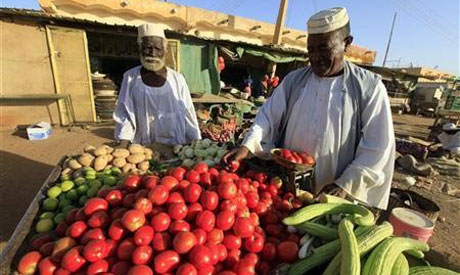
Vegetable sellers in the Sudanese capital, where food prices have grown by more than a third since last Ramadan (Photo: Reuters)
Sudan's currency fell close to its historical low against the dollar as demand for imported food surged before the holy Muslim month of Ramadan, driving up prices and fueling anger over a severe economic crisis.
President Omar Hassan al-Bashir, in power since 1989, has avoided an "Arab spring" but an austerity programme that included scaling back fuel subsidies sparked small-scale protests four weeks ago.
Sudan lost much of its oil resources when South Sudan seceded a year ago, exacerbating an economic crisis and depriving the state of its main source of revenues and dollars.
With Ramadan starting within a day or two, millions of Sudanese are stocking up on meat, spices and sweets to prepare the large meals they will eat in the evenings after fasting all day.
Anti-government protests have so far been small but anger over food prices is rising. Prices usually go up in Ramadan but this year they add to an inflation rate of 37.2 per cent, more double than a year ago.
"It's the most difficult Ramadan we're facing because everything is so expensive. We are buying much less meat this year because we just cannot afford it," said Huda Abdullah, who works for a state university.
"My four sisters, I and my father share our income but it's just not enough to buy enough food for a family," she said, checking grapefruit prices at Khartoum's central food market.
The loss of oil revenues has exacerbated a dollar scarcity fuelling inflation because Sudan needs to import much of its food needs.
Demand for imported food items needed for Ramadan meals, such as meat or sugar used for special juices and sweets, has knocked down the Sudanese pound close to an historic low.
A dollar bought between 6 and 6.1 pounds on the black market on Thursday, close to a historic low of 6.2 reached in May when border fighting with arch foe South Sudan escalated.
The central bank this month devalued the pound against the dollar by setting the exchange rate at between 4.3 and 4.7 from 2.7 previously to bridge the gap with black market rates.
But a failure to pump sufficient dollars into the banking system makes import firms turn back to the black market.
"You don't find sufficient dollars to satisfy demand. It's getting worse," one black market dealer said.
Officials expect inflation to rise further as the government scales back petrol subsidies to help close the 6.5 billion pound ($1.4 billion) budget gap left by the loss of oil revenues.
Traders in the dusty central market said prices for basic food items such as sugar have doubled since last year.
"Sudan's food production is just too small to produce enough," said a trader who gave his name as Sherji.
Shopper Sabah was fuming while buying vegetables for Ramadan. "Vegetables are so expensive, everything is expensive, expensive, expensive," he said. "Why aren't government officials doing anything? Don't they buy anything?"
Youth activists have vowed to continue protests during Ramadan but it is unclear how many will heed the call as scorching heat keeps most people on fast indoors until sunset.
Protests have been so far limited to students, lawyers, intellectuals and pro-democracy activists who have rarely mustered more than a few hundred people at a time.
Bashir has dismissed the protests, saying Sudan will not see an Arab spring, just a hot summer.
Short link: